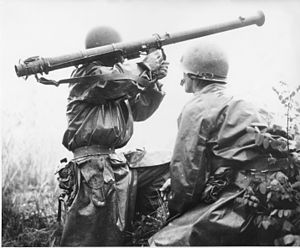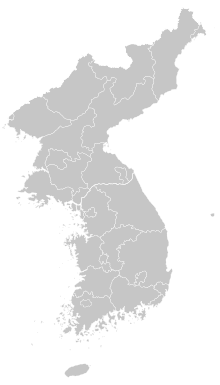
Back معركة أوسان Arabic Batalla de Osan Spanish Bataille d'Osan French קרב אוסן HE Pertempuran Osan ID Battaglia di Osan Italian 烏山の戦い Japanese 오산 전투 Korean Bitwa pod Osan Polish Batalha de Osan Portuguese
| Battle of Osan | |||||||
|---|---|---|---|---|---|---|---|
| Part of the Korean War | |||||||
 A US soldier, Robert L. Witzig, with a 2.36-inch bazooka prepares to take aim at a North Korean tank during the Battle of Pyongtaek which took place after the Battle of Osan. On his right is Kenneth R. Shadrick, who was later reported as the first American killed in the Korean War. | |||||||
| |||||||
| Belligerents | |||||||
|
| |||||||
| Commanders and leaders | |||||||
|
Charles Bradford Smith Miller O. Perry |
Lee Kwon-mu Ryu Kyong-su | ||||||
| Units involved | |||||||
|
1st Battalion, 21st Infantry Battery A 52nd Field Artillery Battalion |
| ||||||
| Strength | |||||||
| 540 infantry and support |
5,000 infantry 36 tanks | ||||||
| Casualties and losses | |||||||
|
60 killed[1] 21 wounded[1] 82 captured[a] 1 howitzer destroyed 5 howitzers disabled |
42 killed 85 wounded 1 tank destroyed 3 tanks disabled | ||||||
Location within Korea | |||||||
The Battle of Osan (Korean: 오산 전투) was the first engagement between the United States and North Korea during the Korean War. On July 5, 1950, Task Force Smith, an American task force of 540 infantry supported by an artillery battery, was moved to Osan, south of Seoul, the capital of South Korea, and was ordered to fight as a rearguard to delay the advancing North Korean forces while more US troops arrived to form a stronger defensive line to the south. The task force lacked both anti-tank guns and effective infantry anti-tank weapons and had been equipped with obsolete 2.36-inch (60 mm) rocket launchers and a few 57 mm recoilless rifles. Aside from a limited number of HEAT shells for the unit's 105 mm howitzers, crew-served weapons that could defeat T-34/85 tanks from the Soviet Union had not yet been distributed to the US Army forces in South Korea.
A North Korean tank column equipped with ex-Soviet T-34/85 tanks overran the task force in the first encounter and continued its advance south. After the North Korean tank column had breached US lines, the task force opened fire on a force of some 5,000 North Korean infantry that were approaching its position, which held up their advance. North Korean troops eventually flanked and overwhelmed the US positions, and the rest of the task force retreated in disorder.
- ^ a b Millett 2010, p. 138.
Cite error: There are <ref group=lower-alpha> tags or {{efn}} templates on this page, but the references will not show without a {{reflist|group=lower-alpha}} template or {{notelist}} template (see the help page).
